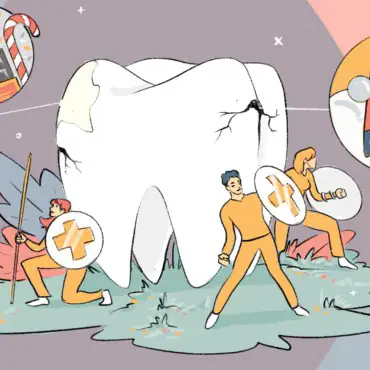For any dental practice, advertising is almost certainly a necessity. According to 2020 statistics, over 201,000 dentists are actively working in the US, so competition is steep. When you pair that with the high cost of office fees, equipment, and staffing, it can be a serious problem. That’s where SEO (search engine optimization) for dentists comes into play.
If you don’t rank on the first Google results page, you are missing out on 95% of your potential clients. Google holds 90.3% of the search engine market share, which means that 9 out of 10 browser searches are carried out on Google. Without proper SEO, you are practically invisible. Let’s discuss.
What is SEO?
To understand what SEO (search engine optimization) is, it’s crucial to cover the basics. SEO for dentists is an online fingerprint that’s unique to your practice. Even though there are plenty of other sites that are optimizing their content, with your own SEO strategy you get to stand out.
SEO for a dental office is a process meant to boost your website rank on Google, Bing, or Yahoo. The idea is to get more traffic and attract potential patients. For that, you will require a well-made website and proper design suitable for dental office marketing.
To boost your odds of success, you can partner up with an esteemed company — one with solid domain authority and search engine presence, like Opencare.
Worry-free insurance verification
Opencare takes the guesswork and effort out of insurance verification.
Why does SEO for dentists attract more patients?
- SEO leads generate a 14.6% close rate, while print ads have just 1.7% outbound leads.
- 75% of people don’t go past the first search page when looking for information online.
- 78% of mobile searches in a local area result in an actual visit to a physical location within the first week.
According to experts, 61% of company owners believe boosting SEO should be their top advertising priority, including improving their organic presence.
An advertising plan requires detailed knowledge to reach the preferred target audience. With SEO for dentists, you are getting exactly that. A website is more than just an option for you to publish basic information.
Clients who find your office online are eight times more likely to try your services. Compared to other patients who found your dental office through other forms of advertising. The reason for that is relatively simple.
You are using the website to address the necessities of every dental patient. It can also help you establish trust and get more attention. In the long run, you are increasing your client base. This makes SEO a powerhouse for dental office marketing.
Where do I start with SEO?
Starting with SEO might look overwhelming, but it’s not as hard as it seems. Every search engine optimization strategy begins with a simple plan.
Incorporate relevant keywords
To find a dentist, clients will search for prospective offices in their area. But in addition to that, they will also search for additional information like bridges, teeth whitening, or other popular procedures. Organic traffic comes from these queries. So, you want to use the keywords that will target all their demands.
Example: Instead of trying to optimize the website for a dental service, it’s critical you use keywords that target the area you work in. These include:
- dental procedures in [your city]
- gum surgery in [your area]
- fillings and repair in [your state]
- dentist plus [your location]
Don’t forget to use phrases and keywords that elaborate on the dental services you provide. Using dental procedures in your site’s URL may not be a good idea, but using keywords like dentures, braces, extractions can show everything that you offer.
Blogging
The better the search engine visibility, the bigger the traffic. For 86% of content marketers, blogging is a key marketing tactic. With blogging, you are both getting attention and building credibility. Potential clients and interested readers will help improve your search rankings.
Eventually, you can become an authoritative figure in your area. Not only does blogging attract patients, but it can also generate some revenue.
Use reliable sources
To inspire a client to book a dentist appointment, you ought to establish credibility. Using quality links on your website will help improve your search ranking. When you compile blog posts, make sure to link adequate and reputable sources.
Then, you can reach out to other bloggers or leaders in the industry and ask them to share that content. This is an excellent method of improving and maintaining high search rankings. However, industry leaders are only willing to work with blogs that create excellent content. So, make sure that the posts you create will garner this type of endorsement.
Five tips for dentist-related SEO
In the early days, SEO optimization was very easy. You only had to focus on a single target keyword, and you would be high on the search engine rank. You would use that same keyword until you get the desired results.
Now, optimizing a page takes more effort. Every keyword should be semantically related. Having a lot of competition only makes things harder. But, that doesn’t mean you won’t reach the target audience. On the contrary, you just need to use a couple of tips that can help turn the tide.
Use tools to find the right SEO keywords for dentists
Keywords have multiple variations, so you shouldn’t stick to only one. The ideal choice would be to rely on keyword research tools. They will help validate your content and ensure you have the SEO you need.
Sign up for our newsletter.
Just let us know a bit about yourself.
Besides, there could be keywords that not all searchers use but that are still relevant. These tools provide insight into deeper levels of SEO, visibility, and analysis:
- CPS (cost per click)
- CTR (click-through-rate)
- SEO difficulty
- Competition
- Search volume
You can use these to gain ideas for your local searches. Options like Majestic SEO, SEMrush, and Cognitive SEO could prove useful.
Understand patients’ intents behind the keywords you use
What is the patient’s intent? Do they simply want to search for a term to find out more about it? Or do they want to know where they can access services as well? You can classify keywords into four different groups based on your client’s intent. You have keywords that are:
- Commercial – Keywords such as these are useful when you want to help a patient make a choice. So, you provide them with useful information before they spend their money. For example, “best dental services in Los Angeles”.
- Informational – With these keywords, you can cover practical topics. It’s about helping patients understand various dental procedures. For example, “how long does gum surgery take” or “what are dentures”.
- Navigational – You’ll use these keywords when a client is looking for a specific site. For instance, if the client puts the name of your dental practice in that search box, then they are using a navigational keyword.
- Transactional – You can use these keywords when a client is simply looking for a deal. They want to spend cash but don’t know where to go. For instance, it can be “where to locate a dentist near me” or “where to get dentures in Toronto, Canada”.
Update the website structure
By all means, ensure your website is responsive for mobile use. It should also be easy to navigate. Whether you have multiple offices or a single dental practice, you should focus on the URL structure. Remember, the website will be the first thing visitors see. So, it has to leave a good impression.
Add the dental office to other local listings
Having your dental office on core local listings and Google My Business is a great way to get attention. That includes both health and general listings. Besides, search engines often turn to local listings when they require reliable local businesses, so this can be a huge perk.
Encourage patients to leave a review online
When it comes to going to the dentist, people don’t want to experiment. They need an expert they can trust. What most people don’t realize is the impact these reviews can have. About 88% of clients trust online reviews more than a recommendation from a friend.
SEO experts believe reviews are an important factor for better local map rankings. Clients can see what other patients are saying and build their expectations based on people’s points of view. The more people leave a positive review, the better the chances of you boosting your rank. With enough positive reviews, you can rank higher on any local digital map.
Having a dental office show up for relevant keywords is a great way to generate a steady client base. It’s a way of establishing credibility and authority with readers. Although it takes plenty of time and effort, this is time well spent. These readers can become potential clients. With the knowledge and tips covered here, you can make a worthwhile change and generate new organic leads for your medical practice. That’s where digital marketing and SEO really make your business shine.







